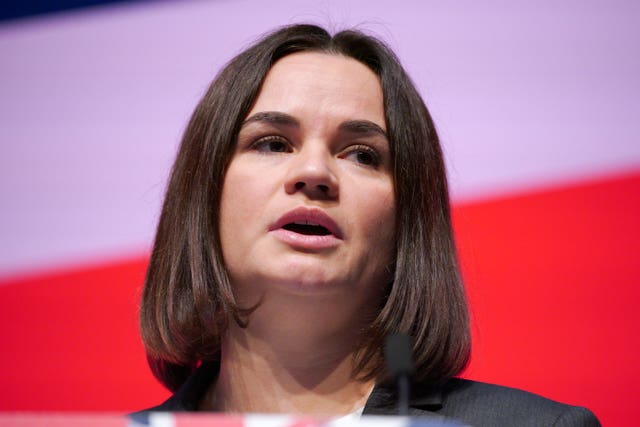
Oli Dugmore 4am - 7am
25 February 2024, 21:44

Most candidates belong to the four officially registered parties, which all support the current president’s policies.
Belarusians were casting their votes on Sunday in tightly controlled parliamentary and local elections that seem set to continue the rule of President Alexander Lukashenko.
Mr Lukashenko has presided over the former Soviet bloc nation for nearly 30 years and has frequently accused the West of trying to use the vote to undermine his government and “destabilise” the nation of 9.5 million people.
Sunday’s vote has gone ahead despite calls for a boycott from the opposition that dismissed the balloting as a “senseless farce.”
Most candidates belong to the four officially registered parties – Belaya Rus, the Communist Party, the Liberal Democratic Party and the Party of Labour and Justice – which all support Mr Lukashenko’s policies. About a dozen other parties were denied registration last year.

Opposition leader Sviatlana Tsikhanouskaya, who is in exile in Lithuania after challenging Mr Lukashenko in the 2020 presidential election, urged voters to boycott the elections.
“There are no people on the ballot who would offer real changes because the regime only has allowed puppets convenient for it to take part,” she said in a video statement.
“We are calling to boycott this senseless farce, to ignore this election without choice.”
Ms Tikhanovskaya’s video address was broadcast in public places throughout Belarus on Saturday after opposition activists were able to gain access to some 2,000 screens used for advertising.
Viasna Human Rights Centre reported on Sunday that a number of employees at the company that owned the screens have been arrested in the Belarusian capital Minsk.
Sunday’s vote is the first election in Belarus since the contentious 2020 vote that handed Mr Lukashenko his sixth term in office and triggered an unprecedented wave of mass demonstrations.
Protests swept the country for months, bringing hundreds of thousands into the streets. More than 35,000 people were arrested.
Thousands were beaten in police custody, and hundreds of independent media outlets and nongovernmental organisations were shut down and outlawed.

Mr Lukashenko relied on subsidies and political support from main ally Russia to survive the protests, allowing Moscow to use Belarusian territory to send troops into Ukraine in February 2022.
The opposition says the early balloting that began on Tuesday offers fertile ground for the vote to be manipulated, with ballot boxes unprotected for five days.
Election officials said nearly a quarter of the country’s voters cast ballots during the first three days of early voting.
The Viasna Human Rights Centre said students, soldiers, teachers and other civil servants were forced to participate in early voting.
Belarus for the first time refused to invite observers from the Organisation for Security and Co-operation in Europe (OSCE) to monitor the election.
Since 1995, not a single election in Belarus has been recognised as free and fair by the OSCE.
The OSCE said the decision not to allow the agency’s monitors deprived the country of a “comprehensive assessment by an international body”.
“The human rights situation in Belarus continues to deteriorate as those who voice dissent or stand up for the human rights of others are subject to investigation, persecution and frequently prosecution,” it said in a statement.
In a statement, a US State Department official described the elections as a “sham”.
“The United States condemns the Lukashenko regime’s sham parliamentary and local elections that concluded today in Belarus. The elections were held in a climate of fear under which no electoral processes could be called democratic,” said spokesman Matthew Miller.
“The United States again calls on the Lukashenko regime to end its crackdown, release all political prisoners, and open dialogue with its political opponents. The Belarusian people deserve better.”
Election officials said on Sunday that more than 40% of the voters had cast ballots during early voting from Tuesday to Saturday.
As of 9pm local time, turnout was 72.98%, meeting the 50% threshold needed under Belarusian law in order for the vote to stand, according to the Belarusian Central Election Commission.
Turnout in Minsk was notably lower than in other Belarusian regions, reaching only 61.54%. By comparison, the area with the next lowest turnout, the wider Minsk region, recorded 74.20%.